中考英语介词知识点解析
初中英语中考语法复习介词知识点

中考英语语法复习介词知识点1.简单介词in on with by for at about under of to at until from before after during above under2.合成介词into within inside outside without throughout3.短语介词according to, because of,in front of,in spite of4.时间介词at、on、in、before、after、during、from、about、by、until5.地点介词in、on、under、at、above、behind、before6.介词用法年月周前要用 in,日子前面却不行。
遇到几号要用"on",上午下午又是"in"要说某日上下午,用 on 换 in 才能行。
午夜黄昏用 at,黎明用它也不错。
at 也在时分前,说"差"用 to,说"过"要用past。
用in:年、月、季节、周、阳光、灯、影、衣、冒(雨)用in;将来时态in表后;小处at,大处in;语言、单位、材料in。
用on:步行、驴、马、玩笑on用at:山脚、门口、在当前,速、温、日落、价、核心用with:具有、工具、和、同随有形with无形by;(with后加工具,工具是有形的;by后加方式,方式是无形的)7.动词+介词常用短语About的短语think about 考虑bring about 导致;引起care about 关心;在意dream about 梦想;梦见hear about 听说hang about 闲逛learn about 了解know about 知道;了解look about 环顾;四处看talk about 谈论;议论worry about 担心write about 编写;写作At的短语arrive at 到达knock at 敲laugh at 嘲笑look at 看point at 指向shout at 朝……大喊smile at 对……微笑throw at 朝……扔Away的短语put away 储存;放好keep sb./sth. away (使)避开;(使)不靠近blow away 吹走,驱散stay away from 与……保持距离;远离give away 赠送get away 逃离move away 搬走go away 离开run away 逃跑,跑掉pass away 去世throw away 扔掉take away 拿走;带走wash away 冲走walk away 起开,离去Back的短语bring back 恢复;使想起;归还give back 归还call(sb.) back 给(某人)回电话go back 回去come back 回来;再度流行pay back 偿还(借款等)get back 回来;返回;回家Down的短语write down 写下;记下take down 拆掉;取下;记下1break down 停止运转;(机器等)出故障turn down 把调低;关小;拒绝calm down 冷静下来cut down 砍倒;缩减die down 减弱;逐渐平息fall down 倒塌;跌倒lie down 躺下pull down 拆除;摧毁put down 放下;记下sit down 坐下slow down (使)减速;(使)放松For的短语search for 搜索;查找thanks for 因……而感激die for 为而死care for 照顾;关怀look for 寻找leave for 动身去pay for 为……付钱stand for 代表prepare for 为……做准备wait for 等待Off的短语burn off 燃烧turn off 关掉cut off 切断;中断break off 突然中止;中断give off 散发;释放get off 下车keep off (使)不接近;远离go off 熄灭;响起put off 推迟;拖延pay off 还清(欠款);成功see off 送行run off 跑掉;逃跑show off 炫耀;显摆set off 动身;启程;使爆炸take off 脱下衣服;(飞机等)起飞shut off 关闭;停止运转On的短语hold on 等一等(别挂电话)pass on 传递keep on 继续(进行)try on 试穿take on 承担;呈现work on 从事;忙于agree on 对意见……一致come on 加油carry on 继续call on 访问;拜访depend on 依靠;依赖;视……而定;取决于decide on 决定;选定get on 上车;进展go on 继续live/feed on 以……为食;靠……谋生put on 穿上;增重;上演turn on 打开Up的短语drive up 开车end up 最终;结束;到头来fill up 装满;填补fix up 修理give up 放弃make up 编造;化妆pick up 接(某人);捡起look up 查阅;查找set up 建立;创立;建造show up 出席;露面take up 开始做;从事;占据stay up 不睡觉;熬夜turn up 调高(音量);出现wake up 睡醒;醒来bring up 养育;提出grow up 成长;长大cheer up 使……振奋;hurry up 赶紧clean up 把(……)打扫干净;put up 张贴;举起;搭建cut up 切碎stand up 站起来dress up 穿上盛装;装扮With的短语deal with 处理;应付play with 和……玩耍agree with 赞同;持相同意见catch up with 赶上(或超过)begin/start with 以……开始come up with 提出;想出(主意、回答等)communicate with 和……交流end up with 以……结束connect with 与……联系talk with 和……交谈part with 放弃;舍弃(尤其不舍得的东西);与……分开get along with 和……相处2。
初中语法大全讲解--介词
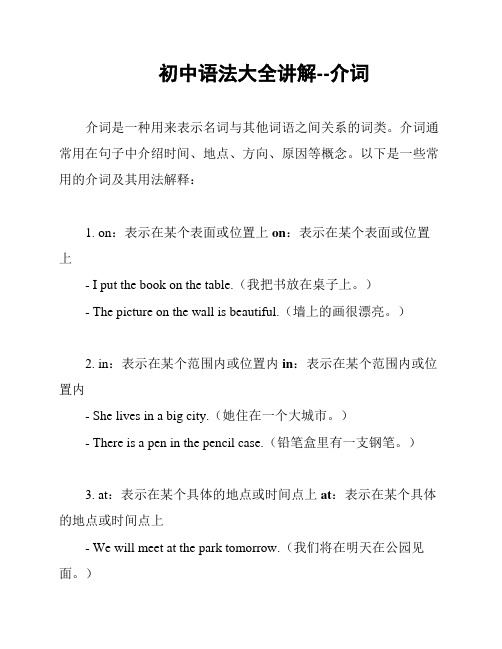
初中语法大全讲解--介词介词是一种用来表示名词与其他词语之间关系的词类。
介词通常用在句子中介绍时间、地点、方向、原因等概念。
以下是一些常用的介词及其用法解释:1. on:表示在某个表面或位置上on:表示在某个表面或位置上- I put the book on the table.(我把书放在桌子上。
)- The picture on the wall is beautiful.(墙上的画很漂亮。
)2. in:表示在某个范围内或位置内in:表示在某个范围内或位置内- She lives in a big city.(她住在一个大城市。
)- There is a pen in the pencil case.(铅笔盒里有一支钢笔。
)3. at:表示在某个具体的地点或时间点上at:表示在某个具体的地点或时间点上- We will meet at the park tomorrow.(我们将在明天在公园见面。
)- He is waiting for you at the front door.(他在门口等你。
)4. to:表示朝向某个目标或对象to:表示朝向某个目标或对象- She walked to school.(她走向学校。
)- Can you pass the book to me?(你能把书递给我吗?)5. with:表示伴随或使用某个工具或对象with:表示伴随或使用某个工具或对象- I went to the park with my friends.(我和我的朋友一起去了公园。
)- He wrote the letter with a pen.(他用钢笔写了这封信。
)6. by:表示通过某种方式或交通工具by:表示通过某种方式或交通工具- We usually go to school by bus.(我们通常坐公交车去学校。
)- She sent the gift by mail.(她通过邮寄发送了礼物。
中考英语常用介词用法和固定搭配总结

中考介词用法总结一、几个常用介词用法归纳(一)in的用法:1. 表示地点、位置。
意思为“在……之中,在……里面”,例如:(1)They often spend holidays in the country. 他们经常在乡下渡假。
(2)The children are playing in the yard. 孩子们在院子里玩耍。
常见搭配:in the school 在学校里;in the way 挡路;in the library在图书馆;in the bookcase 在书架中;in the park在公园;in the chair 在椅子中(扶手椅);in a car = by car 乘车;in the middle of 在……中间;in church去教堂做礼拜;in front of 在……前面(外部);in the church在教堂;in the front of 在……前面(内部);in the hospital在医院;in the wall 在墙内(镶嵌);in hospital在住院;in the tree 在树上(不表生长)be ill in bed卧病在床;in one’s hand 在某人手中;in this way 以这种方式;in the sun 阳光下;in the rain 在雨中;in the wind 在风中;in the sky 在天空中;in one’s dream 在梦中;in the newspaper 在报纸上;in the book 在书上;in my eyes 在我看来;be in 在家;2. 表示时间的范围。
意为“在……时候”,如:(3)He gets up at six in the morning. 他早晨6点起床。
(4)The Second World War ended in 1945. 第二次世界大战在1945年结束。
常见搭配:in winter 在冬天;in the middle of May 五月中旬;in the end 最后;in the future 在将来;in the past 在过去;in the middle of the day 在中午;in/over the last/past ten years在过去的十年中;3. 表示时间的经过。
中考英语知识点汇总之介词和介词短语

一、中考必备知识点汇总之介词和介词短语一、介词的定义介词是一种虚词,不能独立充当句子成分,需与动词、形容词和名词搭配,才能在句子中充当成分。
介词是用于名词或代词之前,表示词与词之间关系的词类,介词常与动词、形容词和名词搭配表示不同意义。
对于介词的考查,更多会放在动词短语或形容词短语中综合考查,单独的针对介词的考查较少出现。
在学习过程中,要牢记教材中出现的动词及形容词与介词搭配的短语。
二.介词及介词短语的句法功能成分说明例句状语多放在动词后或置于句末或句首She works very hard in our office.她在我们办公室工作十分努力。
定语一般放在名词或代词后,作后置定语The football behind the door is mine·门后面的足球是我的。
表语位于be动词或系动词之后Is your uncle still in good health?你叔叔身体还好吧?宾语补足语一般放在宾语之后We found the map quite out of date.我们发现这张地图已经完全过时了。
三.介词(短语)的分类1.表示时间的介词(短语)at 用在具体的时间点之前。
e.g. at five o’clockin 用在年,月,季节之前,用在表泛指的上午。
下午、晚上之前。
e.g.in July、in the afternoonon 用在星期之前,用在具体某天或者某天的上午、下午、晚上之前。
e.g. on the afternoon of July 2ndafter 表示“在……之后”,反义词是before。
before 表示“在……之前”。
除了可以用作介词之外,before还可以做连词和副词。
until 表示“直到”,not until意为“直到……才”。
since 表示“自从”,后跟表示过去的时间点时,通常和现在完成时连用。
during 表示“在……期间”。
e.g.during the speechfrom 和to搭配,from...to...表示“从……到……”。
中考英语介词考点归纳

英 语 中 可 用 于 时 间 名 词 前 的 介 词 有 不 少 ,但 中 考 主 要 考 查 a,o , i t n n 这 三个介 词 的用法 。
1 .介 词 a 主 要 表 示在 某 一 时 刻 或 某 一 时 间 点 。 如 : t Ig tu t 60 vr a .我 每 天 6点 起 床 。 e p a :0 e e dy y 另 外 ,注 意 以 下 搭 配 :a dy ra ( 黎 明 ) t no ( 中 午 ) a t abek 在 ,a o n 在 , t ng t ( 夜 间 ) a C rs s ( 圣 诞 节 期 间 ),a te a e o v ( 五 i h 在 , t hima 在 t t h g ff e 在 i
市 、大洲等 ;而 o n则主要 表示在表 面 。如 : Pes i frme a te b s s t n l e wa o t h u t i .请在公 共汽 车站等 我。 a t ao
j T e pae w l a i n B in t 1 :0 h l i rv i e ig a 30 .飞 机 将 于 1 点 到 达 北 京 。 n l re j 3
D n u teb o n te t l.不要 把书放 在桌子 上 。 o ' p t h o k o h a e t b ; 2 .另 外 ,注 意表 示方 位 的介词 i,t ,o 。i 示在 某地 范 围之 内 ; n o n n表
湖畔 。如 :
j t 示 在 某 地 范 围 之 外 ;o o表 n表 示 与 某地 相 邻 或 接 壤 ,或 表 示 位 于 某 河 畔 或
S ag a l s i te es o hn .上 海 在 中 国 的东 部 。 hn h i i n h at fC ia e
中考英语-介词-超全考点梳理+易错点拨

中考英语-介词-超全考点梳理+易错点拨一、表示时间的介词1. in,on,at,overat用于表示时刻、时间的某一点at lunch在午饭时at breakfast早餐时at noon正午时at night在夜间at that time那时at the moment此刻,目前at the same time同时at times偶尔,有时at nine在九点钟at first开始的时候,起初at last最后►We usually have lunch at noon/ at twelve. 我们通常中午吃午饭(十二点吃午饭)。
注意:表示时间的名词前有this, last, next, every等修饰时,其前面不加介词。
this morning今天早上last Monday上周一every week每周on用于表示某天,某一天的上、下午(指具体的某一时,一律用on)on Monday 在周一on Monday evening 在周一晚上on Tuesday morning 在周二早上on June 6在6月6日on May 4,2016 在2016年5月4日on a cold night在一个寒冷的夜晚on that day在那天on Christmas Day在圣诞节那天on time准时on the night of July(the)first 在七月一日的夜晚►We didn’t listen to the lecture on Wednesday afternoon. 周三下午我们没去听演讲。
in用于表示周、月、季节、年和泛指的上午、下午、晚上(指在一段时间内)。
in the week在这周in the holiday在假期中in May 在五月in 1995在1995年in summer在夏季in Spring在春季in autumn在秋季in winter在冬季in September, 1995 在1995年9月in the morning 在上午in the afternoon 在下午in the evening在晚上in the 21st century在二十一世纪in time及时in an hour一个小时后in a minute一会儿,立刻►The plane took off on time.飞机准时起飞了。
中考介词归纳总结

中考介词归纳总结在中考中,介词是一个非常重要且常考的语法知识点。
介词在句子中起连接作用,表达时间、地点、方式、原因等关系。
掌握介词用法对于理解和运用英语至关重要。
本文将对中考所涵盖的常见介词进行归纳总结。
一、时间介词1. on:表示某一天或某一天的上午、下午、晚上等特定时间。
例:I will have a meeting on Monday.2. at:表示具体的时间点或特定的时刻。
例:We will meet at 9 o'clock.3. in:表示某一年、月、季节、时间段等。
例:She was born in 2005.例:We usually go swimming in summer.4. during:表示在某一段时间内。
例:He read a book during his summer vacation.二、地点介词1. at:表示具体的地点。
例:She is waiting for you at the bus station.2. on:表示表面或某物之上。
例:There is a book on the table.3. in:表示在某个范围、区域、国家或大洲内。
例:We live in a small town.4. to:表示朝向、方向。
例:He went to the library.三、方式介词1. by:表示通过某种交通方式或手段。
例:I usually go to school by bus.2. with:表示伴随、陪同。
例:She walks to school with her friends.3. in:表示用某种方式或手段。
例:He communicated with her in English.四、原因介词1. for:表示目的、原因或理由。
例:He went to the store for some milk.2. because of:表示因为。
中考英语语法难点大全之二:介词
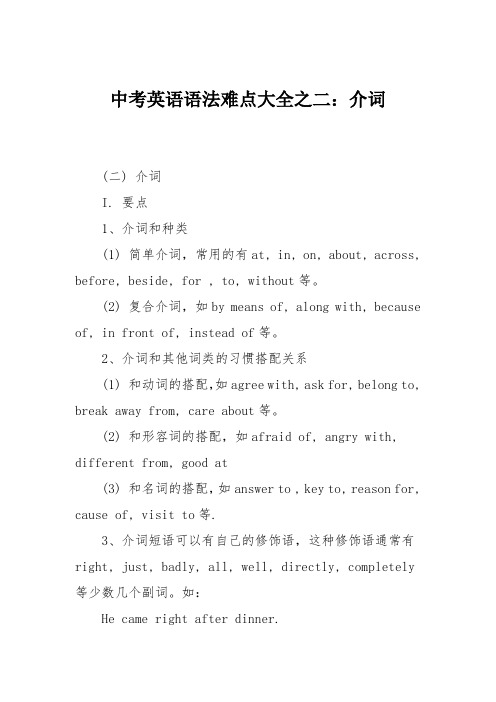
中考英语语法难点大全之二:介词(二) 介词I. 要点1、介词和种类(1) 简单介词,常用的有at, in, on, about, across, before, beside, for , to, without等。
(2) 复合介词,如by means of, along with, because of, in front of, instead of等。
2、介词和其他词类的习惯搭配关系(1) 和动词的搭配,如agree with, ask for, belong to, break away from, care about等。
(2) 和形容词的搭配,如afraid of, angry with, different from, good at(3) 和名词的搭配,如answer to , key to, reason for, cause of, visit to等.3、介词短语可以有自己的修饰语,这种修饰语通常有right, just, badly, all, well, directly, completely 等少数几个副词。
如:He came right after dinner.He lives directly opposite the school.4、某些介词的意义与用法举例(1) at, on, in(表时间)表示时间点用at,如at four o’clock, at midnight 等;表示不确定的时间或短期假日也用at,如at that time, at Christmas等。
指某天用on, 如on Monday, on the end of November, 指某天的朝夕用on,如on Friday morning, on the afternoon of September lst等。
指长于或短于一天的时段用in,如in the afternoon, in February, in Summer, in 1999等。
中考英语介词的用法讲解

中考英语介词的用法讲解一、知识框架二、知识点梳理一、定义:介词:是一种用来表示词与词、词与句之间的关系的词,在句中不能单独作句子成分。
二、介词短语的句法作用1、介词短语相当于一个形容词或副词,可用作状语、定语和表语。
如:The man came <down the stairs>.(状)The woman <with a flower on her head> is from the countryside.(定)The teacher is now with the pupils.(表)(老师现在和学生在一起)2、介词短语在句子中的位置:介词短语做状语时,如果表示时间/地点,可以放在句首或句尾。
如果表示方向/方式/伴随/涉及/原因/目的/比较,一般放在句尾;介词短语作表语时放在连系动词之后;介词短语作定语时,只能放在被修饰的名词之后。
如:He wanted to find a good job in Shanghai the next year.(状语)They searched the room for the thief.The letters are for you.(表语)Have you seen a cat with a black head and four white legs?(定语)三、介词用法(一)表时间的介词:1.at通常用于:(表示在某个时刻或者瞬间)at+时间点,节日(泛指圣诞节、新年等整个假期时,要用at)如:at 7:30; at lunch time; at Christmas 在圣诞节期间固定词组搭配:at dawn, at night, at midnight, at noon, at that time, at the moment2. on通常用于:(表示在具体的某一天或者某天的上下午等)on+具体时间(日期,星期几)on October 1st ; on Monday; on a rainy morning; on Teachers’ Dayon Christmas Day 在圣诞节这一天3. in通常用于:(表示在一段时间里)①in+世纪/年/月/季节/早/中/晚in the 20th century, in the late 18th century②特定的年龄段,in his thirties (在他30多岁时)补充1:表示“在一段时间之后”,句子常用一般将来时。
(英语)中考英语介词易错剖析含解析
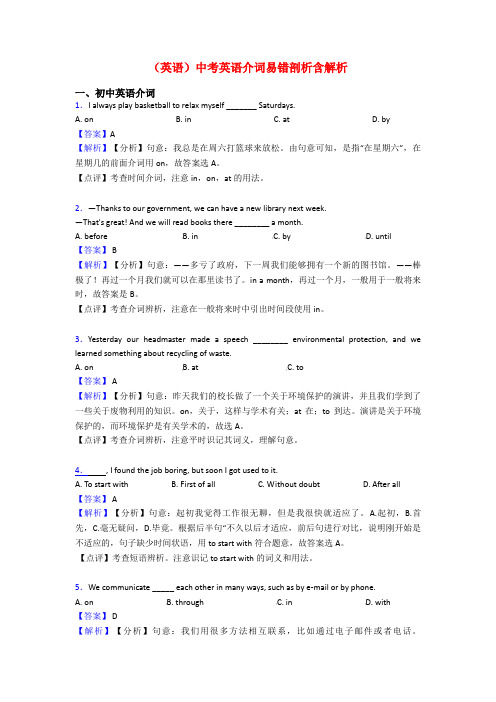
(英语)中考英语介词易错剖析含解析一、初中英语介词1.I always play basketball to relax myself _______ Saturdays.A. onB. inC. atD. by【答案】A【解析】【分析】句意:我总是在周六打篮球来放松。
由句意可知,是指“在星期六”,在星期几的前面介词用on,故答案选A。
【点评】考查时间介词,注意in,on,at的用法。
2.—Thanks to our government, we can have a new library next week.—That's great! And we will read books there ________ a month.A. beforeB. inC. byD. until【答案】 B【解析】【分析】句意:——多亏了政府,下一周我们能够拥有一个新的图书馆。
——棒极了!再过一个月我们就可以在那里读书了。
in a month,再过一个月,一般用于一般将来时,故答案是B。
【点评】考查介词辨析,注意在一般将来时中引出时间段使用in。
3.Yesterday our headmaster made a speech ________ environmental protection, and we learned something about recycling of waste.A. onB. atC. to【答案】 A【解析】【分析】句意:昨天我们的校长做了一个关于环境保护的演讲,并且我们学到了一些关于废物利用的知识。
on,关于,这样与学术有关;at在;to到达。
演讲是关于环境保护的,而环境保护是有关学术的,故选A。
【点评】考查介词辨析,注意平时识记其词义,理解句意。
4. , I found the job boring, but soon I got used to it.A. To start withB. First of allC. Without doubtD. After all【答案】 A【解析】【分析】句意:起初我觉得工作很无聊,但是我很快就适应了。
中考英语介词的用法讲解
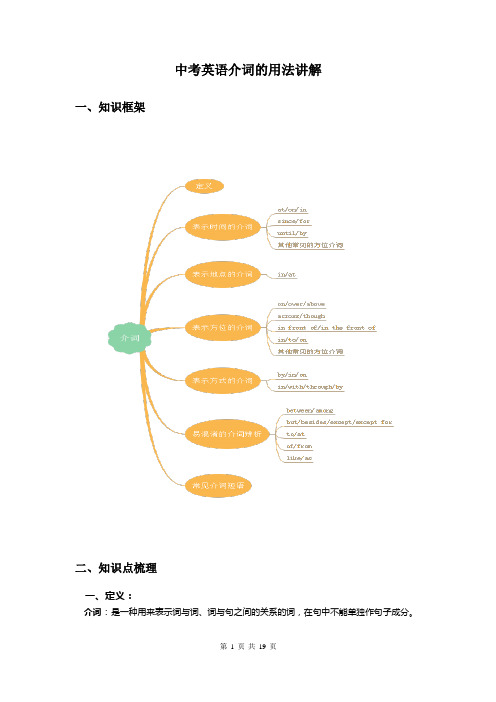
中考英语介词的用法讲解一、知识框架二、知识点梳理一、定义:介词:是一种用来表示词与词、词与句之间的关系的词,在句中不能单独作句子成分。
二、介词短语的句法作用1、介词短语相当于一个形容词或副词,可用作状语、定语和表语。
如:The man came <down the stairs>.(状)The woman <with a flower on her head> is from the countryside.(定)The teacher is now with the pupils.(表)(老师现在和学生在一起)2、介词短语在句子中的位置:介词短语做状语时,如果表示时间/地点,可以放在句首或句尾。
如果表示方向/方式/伴随/涉及/原因/目的/比较,一般放在句尾;介词短语作表语时放在连系动词之后;介词短语作定语时,只能放在被修饰的名词之后。
如:He wanted to find a good job in Shanghai the next year.(状语)They searched the room for the thief.The letters are for you.(表语)Have you seen a cat with a black head and four white legs?(定语)三、介词用法(一)表时间的介词:1.at通常用于:(表示在某个时刻或者瞬间)at+时间点,节日(泛指圣诞节、新年等整个假期时,要用at)如:at 7:30; at lunch time; at Christmas 在圣诞节期间固定词组搭配:at dawn, at night, at midnight, at noon, at that time, at the moment2. on通常用于:(表示在具体的某一天或者某天的上下午等)on+具体时间(日期,星期几)on October 1st ; on Monday; on a rainy morning; on Teachers’ Dayon Christmas Day 在圣诞节这一天3. in通常用于:(表示在一段时间里)①in+世纪/年/月/季节/早/中/晚in the 20th century, in the late 18th century②特定的年龄段,in his thirties (在他30多岁时)补充1:表示“在一段时间之后”,句子常用一般将来时。
2023年英语中考语法知识介词分类讲解(共18类)

【语法笔记】介词:一、表示方位in:在某块更大地域的内部on:两块地接壤, 挨着to:两块地不接壤, 中间隔着【例】上海位于中国的东部.Shanghai is in the east of China.(上海是中国境内的一座城市, 处于中国内部)广东在广西的东南边.Guangdong is on the southeast of Guangxi.(广东与广西挨着, 两块地域相邻)台湾在福建省的东南面.Taiwan is to the southeast of Fujian.(台湾与福建隔海相望, 中间并不接壤, 隔得较远)east东south南west西north北①以上4个方位词既是名词(n.),又是副词(adv.)②两两组合, 就可以组成:东南southeast、东北northeast、西南southwest、西北southnorth另4个方向.【例】向西走用名词:go to the west(west属于特指, 前面必须加定冠词the)所有特指的名词前面都要加the, 比如太阳☀️只有一个, 使用时-the Sun, 同理月亮 -the Moongo是不及物动词(vi),后面跟名词必须要加介词to(不清楚及物动词/不及物动词的小伙伴, 请跳转 :【笔记】英语语法入门到精通(17)| 动词之:及物动词&不及物动词)用副词:go west(这里副词west修饰动词go)【例】向西走10米.go west/ go to the west ___ 10 meters.根据之前的结构判断原则, 10米属于名词, 前面的结构是完整的, 只不过省略了主语.go west是谓语+adv.,这里可以看成是主谓+adv., 结构完整.go to the west中, go是谓语, 介词to和名词the west共同构成介词短语, 整体也可看成主谓+介词短语, 结构完整.剩下的10meters是名词, 而完整的句子结构后面只能是adv./介词短语, 因此空行里一定是介词.答案:go west/ go to the west for 10 meters.二、表示上下↑在....上:over、above、on↓在....下:beneath、under、below①正上-正下:over-underover还有覆盖在某物体上面的意思, 也属于接触面, 但注意和on的区别, on只表示在物体表面, 没有覆盖的意思.②非正上-非正下:above-below不强调正上方/正下方时, 只要是上/下方都可以用.③表面上-表面下:on-beneath【例】你头顶正上方有一幅画.There is a painting over your head.树下面有一只大象 .There is an elephant under the tree.树上有很多苹果.There are many apples on the tree.(苹果是长在树上 的, 属于接触表面)地下有很多文物.There are a lot of antiques beneath the ground.(也可以用underground 一个词表示“地下”)飞机 在云层上飞行.The plane flew above the clouds.气球在房子 上方10米处.A balloon is 10 meters above the house.(可以加具体数量词精确描述)请把你的名字写在下面.Please write your name below.三、表示前后前:in (the)front of/before后:in/at(the)back of/behind【例】那辆车在我的后面.The car is in back of me.The car is at back of me.The car is behind me.(更常用这句)我们在这座雕像前拍照吧.Let's take a photo in front of/before the statue.他坐在教室里的前面.He sits in the front of the classroom.他坐在车里的后面.He sits in the back of the car.He sits at the back of the car.四、表示附近/周围周围:around附近:near旁边:by/beside/next to【例】我手边有一支笔.There is a pen next to/beside my hand.电话在窗户旁边.The telephone is by the window.书在柜子边.The book is beside the cabinet.小狗绕着我跑.The dog ran around me.老师住在我家附近.My teacher lives near my home.五、表示中间两者之间:between在许多东西中间(3个及以上):among在许多东西的正中间(3个及以上):in the middle of【例】他坐在我和Tom的中间.He sits between me and Tom.他们在人群中行走.They walked among the crowds.他在那群人中很优秀.He is outstanding among those people.他正站在人群的正中央.He is standing in the middle of the crowd.六、表示穿越/穿过横穿:across(随随便便地穿过去)从物体内部穿过:through(水从水管流过)从物体上方穿过:over(跨栏杆)从物体旁边穿过:pass/by【例】这条小路穿过一片树林.The path goes through a wood.(小路是从树林里穿过)透过这扇窗, 你能看到一座教堂.Through the window, you can see a church.(through还可以表示目光穿过)我能隔墙听到他们交谈.I can hear their talk through the wall.(through还可以表示透过...听到声音)你穿过这道大门, 就看到左面的房子了.Go through this gate, and you'll see the house on your left.(人走过大门, 也是内部穿过)( 注意:这句话由2个简单句组成,中间逗号隔开, 并用and连接)他独自一人穿越了沙漠.He went across the desert alone.(alone这里做副词)飞机飞过了一座城市.The plane flew(fly过去式) over a city.他跳过了篱笆.He jumped over the fence.我经过了你的家.I passed your home.七、instead / instead of表示代替/而是instead-副词(adv.)instead of-介词【例】他没买手机, 而是买了电脑.① He didn't buy a phone instead of buying a laptop.(1句话)instead of是介词, 后面原本要加名词, 但buy是动词, 放在介词后面要变成ing形式(即动词+ing做为名词成分, 属于非谓语动词的一种, 后面会细讲, 记得关注哦~)句子结构分析:He didn't buy a phone.是一套完整的主谓宾,后面可以直接加介词短语/副词, instead of是介词, 后面要加名词, 把动词buy变ing形式, 变成名词.② He didn't buy a phone.He bought a laptop instead.(2个简单句)同理, 前后2句都是完整的主谓宾,instead是副词, 原句意是买电脑替代了原本要买的手机, 所以instead放在第2句里.洗淋浴吧, 别用浴缸了.Take a shower instead of a bath.Don't use the bath.Take a shower instead.八、according to / based onaccording to根据based on以...为基础2个都是介词短语, 在句子里前后都能放.【例】据迈克说, 这是一部很棒的电影.According to Mike, it's a great movie.(放句首要用逗号隔开)根据我的经验, 明天会下雪.It will snow tomorrow according to my experience.(不放句首时不用逗号隔开)本书是根据个人经历写成的.The book is based on personal experience.九、besides / except /except for /apart from表示除了...注意区别:besides如果去掉s,就是beside在...旁边besides-表示除了, 还...., 包括“除了”的那部分, 比如:除了喜欢吃香蕉 , 还喜欢吃苹果.两者仍然都属于“喜欢吃”的范围内.except-仅表示除了...之外, 排除意味更明显.except for-用法同except, 但更强调美中不足的那部分.apart from-besides和except的用法都可以用.【例】除了周末我们每天都工作.We work every day except/apart from weekend.(把周末排除在外)除足球外你还喜欢哪些运动?What other sports do you like besides football?(除了喜欢...还喜欢....)除了英语, 我还喜欢数学.I like math besides/apart from English.你英语很好, 除了一些语法错误.Your English is good except for some grammar mistakes.(美中不足)十、ahead of表示在...前面①不同于03部分的方位介词, ahead of的“前面”更宽泛:方位/时间(提前)/能力(优秀)/名次(领先)...② ahead of前面可以加数量词修饰.【例】有两只猫 在我们前面.Two cats are ahead of us.(表示方位,可与 03部分的方位词替换)我在最后期限之前完成了作业.I finished homework ahead of the deadline.我们提前15分钟完成了测验.We finished test 15 minutes(数量/时间) ahead of time.她前程远大.She has a great future ahead of her.(a great表示数量多,程度深)她总是遥遥领先班上的同学.She was always(adv.做状语) ahead of her classmates.十一、as for 表示至于...【例】至于作业, 我明天会完成.As for my homework, I will finish it tomorrow.至于这封信, 我交给他了.As for this letter, I gave it to him.至于其他人, 回家吧.As for the others, go home.十二、of/about/on表示关于...of-比较浅显地提及, 聊到, 顺带提一嘴的感觉about-比of稍深入一点, 日常使用on-比较正式介绍时使用, 偏专业【例】昨天晚上他没有提起他妈妈.He didn't talk about his mother last night.他们谈到即将到来的圣诞节.They talk of the coming Christmas.我没有想(考虑)到成本.I don't think of the cost.。
中考英语常用介词用法与辨析
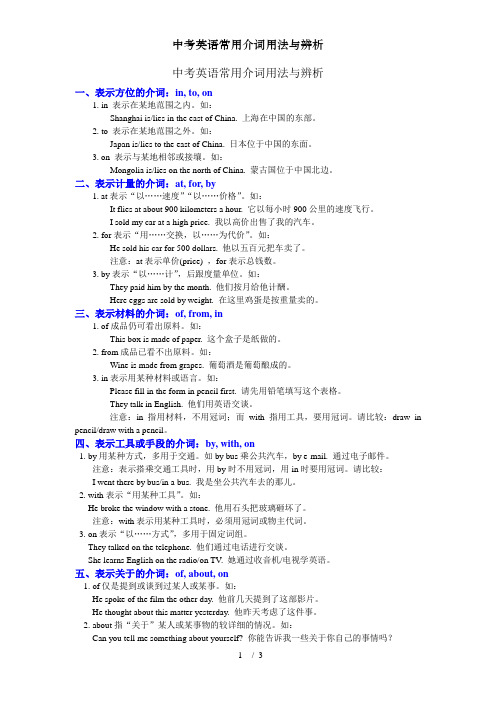
中考英语常用介词用法与辨析一、表示方位的介词:in, to, on1. in 表示在某地范围之内。
如:Shanghai is/lies in the east of China. 上海在中国的东部。
2. to 表示在某地范围之外。
如:Japan is/lies to the east of China. 日本位于中国的东面。
3. on 表示与某地相邻或接壤。
如:Mongolia is/lies on the north of China. 蒙古国位于中国北边。
二、表示计量的介词:at, for, by1. at表示“以……速度”“以……价格”。
如:It flies at about 900 kilometers a hour. 它以每小时900公里的速度飞行。
I sold my car at a high price. 我以高价出售了我的汽车。
2. for表示“用……交换,以……为代价”。
如:He sold his car for 500 dollars. 他以五百元把车卖了。
注意:at表示单价(price) ,for表示总钱数。
3. by表示“以……计”,后跟度量单位。
如:They paid him by the month. 他们按月给他计酬。
Here eggs are sold by weight. 在这里鸡蛋是按重量卖的。
三、表示材料的介词:of, from, in1. of成品仍可看出原料。
如:This box is made of paper. 这个盒子是纸做的。
2. from成品已看不出原料。
如:Wine is made from grapes. 葡萄酒是葡萄酿成的。
3. in表示用某种材料或语言。
如:Please fill in the form in pencil first. 请先用铅笔填写这个表格。
They talk in English. 他们用英语交谈。
注意:in指用材料,不用冠词;而with指用工具,要用冠词。
人教版中考英语中考英语总复习 介词考点解析(Word版附答案)
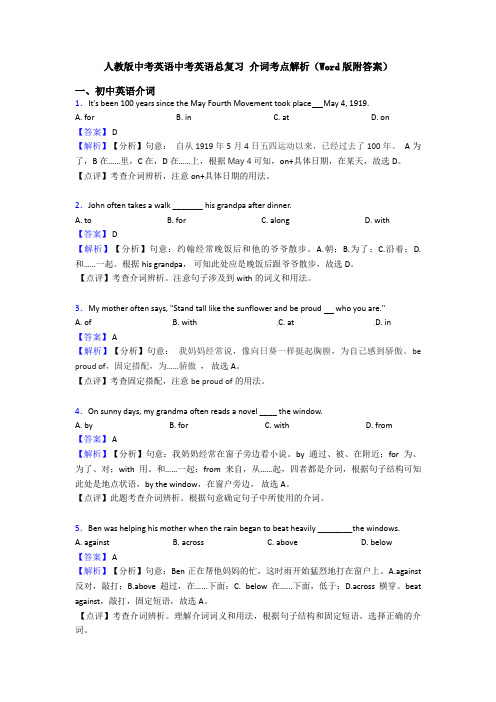
人教版中考英语中考英语总复习介词考点解析(Word版附答案)一、初中英语介词1.It's been 100 years since the May Fourth Movement took place May 4, 1919.A. forB. inC. atD. on【答案】 D【解析】【分析】句意:自从1919年5月4日五四运动以来,已经过去了100年。
A为了,B在……里,C在,D在……上,根据May 4可知,on+具体日期,在某天,故选D。
【点评】考查介词辨析,注意on+具体日期的用法。
2.John often takes a walk _______ his grandpa after dinner.A. toB. forC. alongD. with【答案】 D【解析】【分析】句意:约翰经常晚饭后和他的爷爷散步。
A.朝;B.为了;C.沿着;D.和……一起。
根据his grandpa,可知此处应是晚饭后跟爷爷散步,故选D。
【点评】考查介词辨析。
注意句子涉及到with的词义和用法。
3.My mother often says, "Stand tall like the sunflower and be proud who you are." A. of B. with C. at D. in【答案】 A【解析】【分析】句意:我妈妈经常说,像向日葵一样挺起胸膛,为自己感到骄傲。
be proud of,固定搭配,为……骄傲,故选A。
【点评】考查固定搭配,注意be proud of的用法。
4.On sunny days, my grandma often reads a novel ____ the window.A. byB. forC. withD. from【答案】 A【解析】【分析】句意:我奶奶经常在窗子旁边看小说。
by通过、被、在附近;for为、为了、对;with用、和……一起;from 来自,从……起,四者都是介词,根据句子结构可知此处是地点状语,by the window,在窗户旁边,故选A。
【中考英语语法汇总】介词语法讲解
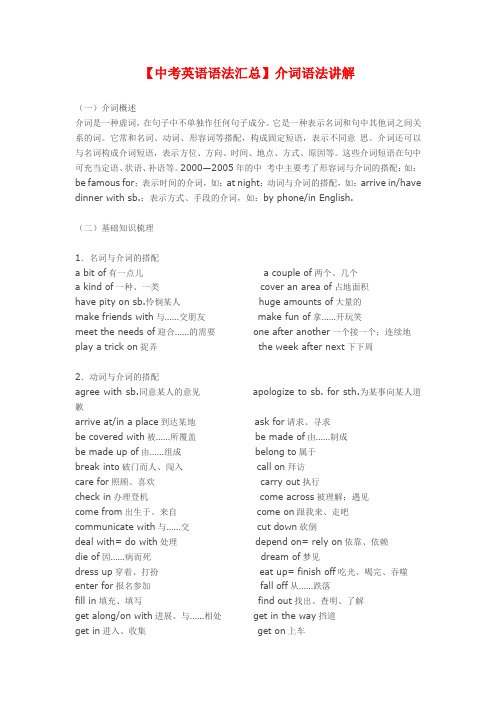
【中考英语语法汇总】介词语法讲解(一)介词概述介词是一种虚词,在句子中不单独作任何句子成分。
它是一种表示名词和句中其他词之间关系的词。
它常和名词、动词、形容词等搭配,构成固定短语,表示不同意思。
介词还可以与名词构成介词短语,表示方位、方向、时间、地点、方式、原因等。
这些介词短语在句中可充当定语、状语、补语等。
2000—2005年的中考中主要考了形容词与介词的搭配:如:be famous for;表示时间的介词,如:at night;动词与介词的搭配,如:arrive in/have dinner with sb.;表示方式、手段的介词,如:by phone/in English.(二)基础知识梳理1.名词与介词的搭配a bit of有一点儿 a couple of两个、几个a kind of一种、一类 cover an area of占地面积have pity on sb.怜悯某人huge amounts of大量的make friends with与……交朋友 make fun of拿……开玩笑meet the needs of迎合……的需要 one after another一个接一个;连续地play a trick on捉弄 the week after next下下周2.动词与介词的搭配agree with sb.同意某人的意见 apologize to sb. for sth.为某事向某人道歉arrive at/in a place到达某地 ask for请求、寻求be covered with被……所覆盖 be made of由……制成be made up of由……组成 belong to属于break into破门而人、闯入 call on拜访care for照顾、喜欢 carry out执行check in办理登机 come across被理解;遇见come from出生于、来自 come on跟我来、走吧communicate with与……交cut down砍倒deal with= do with处理depend on= rely on依靠、依赖die of因……病而死dream of梦见dress up穿着、打扮 eat up= finish off吃光、喝完、吞噬enter for报名参加fall off从……跌落fill in填充、填写 find out找出、查明、了解get along/on with进展、与……相处 get in the way挡道get in进入、收集 get on上车get off下车 get rid of摆脱get ready for为….作准备 get to到达get tired of对……感到厌倦 go in for参加、从事于、酷爱,'^ go ahead先走、向前走;去吧 go for a swim去游泳go on a diet实行节食 go over复习go on with继续做某事 grow up长大、成长hand in上交 hear from收到……的来信hear of听说 help sb. with sth.帮助某人做某事hold on等等(别挂电话)hold up举起hurry off匆忙离开join.n参加、加入keep... from使……不做 keep in touch with与……保持联系keep off阻挡;不让接近 knock over撞倒、撞翻later on过来;后来 laugh at嘲笑learn.., from向……学习 leave for动身去let out放出 line up整队;排成行live on靠……为生look after照顾;照料look at看;观看 look for寻找look forward to期待着 look like看上去像;显得look out of从……朝外看look up查寻;抬头看make out辨认出make up one's mind下决心meet with遭遇 operate on sb.为……动手术pay for付……钱 pick out拾起play with玩弄point at指向;指着point out指出praise sb. for sth.为某事表扬某人prefer... to(比起……来)更喜欢 prepare for准备protect... from保护……免受 pull down推倒put off延期put on穿;戴上;上演put out伸出 put up举起;挂起run after追捕;追踪 run away逃跑search for搜寻;搜查see off为……送行sell out售完 set out/off for出发去……;起程去……set up建立;设立. shake hands with与……握手share with与……分享show off炫耀show sb around带某人参观 shut up住口speed up加快速度stop...from阻止……做take away拿走 take care of照料take charge of负责;管理;take hold of抓住take in吸入 take off脱掉(衣物等);起飞take out取出take part in参加take up开始从事 talk about谈到talk to/with与...谈话 tell... from区别;分辨think of想起;想到 think over仔细考虑throw away扔掉 tie up捆绑try on 试穿turn down(把音量)调低turn into变成 turn off关掉(电灯、电视、收音机等)turn on开,旋开(电灯、电视、收音机等) turn over翻车;翻阅;翻身turn out结果是;证明是 wake up醒来;叫醒wait for等待;等候 write down写下work out算出;制定出经典例题:1.The foreigners arrived __________Shanghai __________ night.A. at…atB. in…atC. in... inD. at... in2. Wushu is becoming more and more popular __________ westerners.A. amongB. betweenC. inD.within3. __________ the help of the teachers, we decorated. Ourclassroom__________lanterns, flowers and pictures yesterday.A. Under... withoutB. Under... amongC. With... withD.With...between4. The cakes __________ the shape of a round moon is called mooncakes.A. likeB. look likeC. asD. likes5.改错:The manager told his secretary that he would be back __________ three-thirty.A. inB. afterC. beforeD. at6. It was clever __________ the boy to work __________ the mathsproblems in less than ten minutes.A. for…outB. of... outC. for...onD. of... on7. My aunt Jane tried her best to reduce her weight ________ 6kg.A.about B.at C.to D.by8. In my opinion, I agree __________ you __________that.A. to… withB. with…toC. with.., withD. with.., on9. I am familiar__________ this school since I have worked here for morethan fifteen years.A. withB. toC. aboutD. of10. Would you please look __________ my baby girl __________ myabsence?A. after…duringB. for…duringC. after… inD. to...in11. Mexico is ________ the south of America.A. inB. toC. onD. of12. The boy ____ the bike is Jackie Hu from Britain.A. byB. onC. inD. with13. Smoking and drinking are not good _______ your health.A. forB. toC. ofD. at14. Can you see the cat hiding __________ the tree?A. onB. underC. overD. in15. The litter bin__________ the corner of the room is a present from mybrother.A. atB. onC. inD. among16. It's fun to see a large number of stars shining in the sky ________ aclear night.A. atB. inC. onD. of1. 【解析】答案是B。
中考突破介词专项讲解

A. at,on
B. at, in
C. in, at D. in, on
He passed by me.
练习:1. As time _p_a_s_s_e_d__, they became friends in the end. 2.
Please wake me up at half ___p_a_s_t __six.
3. Ten forty-five means a quarter ____to____ eleven.
please. (2011广东中考)
A. to
B. in
C. at D. for
解析:It's time for sth 是固定搭配的词组。表示“该干某事的时候
了”。
答案:D
英语
3. Connie arrived________ the village ________ a snowy
night. (2010广东中考)
练习:1. I study English ___b_y____ asking the teacher for help.
2. I often go to school ___b_y____bike. 3. He often goes to
school ____o_n___ his bike.
4. You must write it ____i_n___ Japanese. 5. You can write it
hour, he came back.
after+时间点, 用于将来时,表示“在……以后”。 He will
come back after 5 o'clock.
时间段+ later,表示“在……之后”。
中考英语 介词知识点 表示其他意义的介词
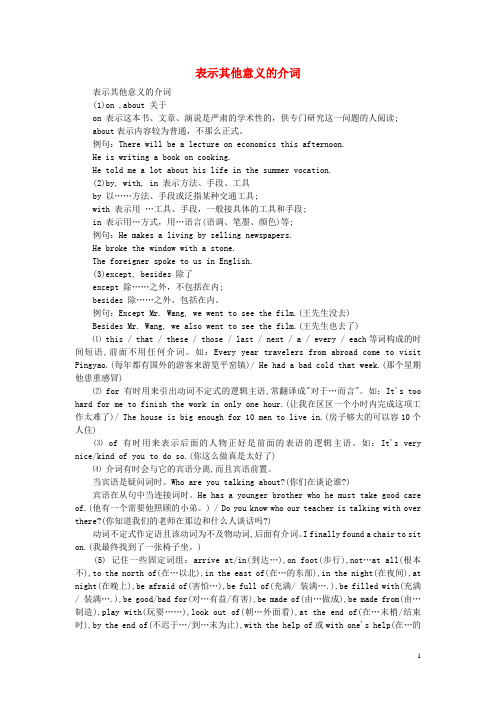
表示其他意义的介词表示其他意义的介词(1)on ,about 关于on 表示这本书、文章、演说是严肃的学术性的,供专门研究这一问题的人阅读;about表示内容较为普通,不那么正式。
例句:There will be a lecture on economics this afternoon.He is writing a book on cooking.He told me a lot about his life in the summer vocation.(2)by, with, in 表示方法、手段、工具by 以……方法、手段或泛指某种交通工具;with 表示用…工具、手段,一般接具体的工具和手段;in 表示用…方式,用…语言(语调、笔墨、颜色)等;例句:He makes a living by selling newspapers.He broke the window with a stone.The foreigner spoke to us in English.(3)except, besides 除了except 除……之外,不包括在内;besides 除……之外,包括在内。
例句:Except Mr. Wang, we went to see the film.(王先生没去)Besides Mr. Wang, we also went to see the film.(王先生也去了)⑴ this / that / these / those / last / next / a / every / each等词构成的时间短语,前面不用任何介词。
如:Every year travelers from abroad come to visit Pingyao.(每年都有国外的游客来游览平窑镇)/ He had a bad cold that week.(那个星期他患重感冒)⑵ for有时用来引出动词不定式的逻辑主语,常翻译成"对于…而言"。
- 1、下载文档前请自行甄别文档内容的完整性,平台不提供额外的编辑、内容补充、找答案等附加服务。
- 2、"仅部分预览"的文档,不可在线预览部分如存在完整性等问题,可反馈申请退款(可完整预览的文档不适用该条件!)。
- 3、如文档侵犯您的权益,请联系客服反馈,我们会尽快为您处理(人工客服工作时间:9:00-18:30)。
(一)介词在英语中用法很活,也无一定规律可循。
在初中范围内还应学一个记住一个,特别是那些和动词的特殊搭配。
这样长期下去不断学习自然会总结出一套自己的规律来。
下面是一般介词表示时间表示地点方位表示原因方式其他about about five o'clock about five kilometres 关于、talk about youaboveabove sea levelacross 横过walk across the street对面across the streetafterafter supperone after another追赶run after youagainstagainst the wall, against the windbe against youamongamong the treesatat tenat the school gateat high speedat mebeforebefore lunchsit before mebehind 位于……behind the treebelowbelow zerobelow the standardby 到……时刻,在……时刻之前by five o'clocksite by siteby air, by bickwas made by usduring 在……期间during the holidaysforfor five yearsleave for Shanghai 为了,对于be good for youfrom from morning till nightfrom New York由某原料制成be made fromwhere are you fromin in a weekin the roomin English 穿着in redintowalk into除divide intoturn into waternear near five years near the park ofbe made ofa map of U. S .Aon 某日、某日的上下午on Sunday afternoonon the desk 靠吃……为生live on rice a book on Physicsover work over night 在上方over the desk超过,over five pairspastten past fivewalk past the parksincesince 1980Since you were illthrough through his lifethrough the foresttill until till five o'clocktofive to tento Shanghaiface to face给予give a book to meunderunder the deskunder ten在……管制之下under the rulewith with a pen 带着,具有with mewithoutwithout air(二)[误]We got to the top of the mountain in daybreak.[正]We got to the top of the mountain at day break.[析]at用于具体时刻之前,如:sunrise, midday, noon, sunset, midnight, night。
[误]Don't sleep at daytime[正]Don't sleep in daytime.[析]in 要用于较长的一段时间之内,如:in the morning / afternoon, 或in the week / month/ year. 或in spring / supper /autumn / winter[误]We visited the old man in Sunday afternoon.[正]We visited the old man on Sunday afternoon.[析]in the morning, in the afternoon 如果在这两个短语中加入任何修饰词其前面的介词都要改为on, 如:on a cold morning, on the morning of July 14th[误]He became a writter at his twenties[正]He became a writter in his twenties[析]这句话应译为:他在20多岁时就成了作家。
在某人的一段生活时间段中要用介词in 来表示,而在具体岁数时用at[误]He went to New York to find a job in sixteen years old.[正]He went to New York to find a job at sixteen.[析]在具体年岁前用at, 如:at the age of 12,at your age,[误]We went to swim in the river in a very hot day.[正]We went to swim in the river on a very hot day.[析]具体某一天要用介词on, 又如:on New Year's Day[误]I'm looking forward to seeing you on Christmas.[正]I'm looking for ward to seeing you at Christmas.[析]在节日的当天用on,而全部节日期间用at,Christmas是圣诞节期间,一般要有两周[误]I haven't see you during the summer holidays.[正]I haven't seen you since the beginning of the summer holidays.[析]during表示在某一段时间之内,所以一般不与完成时搭配,如:I visited a lot of museums during the holiday. 而for表示一段时间,可以用于完成时,如:I haven't see you for a long time. 而through 用来表示时间时则为"整整,全部的时间"。
如:It rained through the night.since[误]At entering the classroom, I heard the good news.[正]On entering the classroom, I heard the good news.[析]On 加动名词表示"一……就"。
本句的译文应是:我一进入教室就听见这个好消息了。
又如:on hearing…一听见,on arrival 一到达就……(on表示动作的名词)[误]In the beginning of the book, there are some interesting stories.[正]At the beginning of the book, there are some interesting stories.[析]at the begining与at the end都是指某事物的开始与结束部分,均不指时间范围,而in the beginning 则是指开始一段时间。
in the end=at last是指"最终,终于"[误]Till the end of next week. I will have finished this work.[正]By the end of next week. I will have finished this work.[析]by 引起的时间状语表示了动作的截止点,其意思为"不迟于某一时刻将工作做完",所以主句一般是完成时态。
当然可以有将来时态,如:I'll be there by five o'clock.而till则表达其一动作一直持续到某一时刻,但句中的动词一定要用持续性动词,而瞬间的截止性动词应用其否定句式,如:I won't finish this work till(until) next weekend.[误]He came to London before last weekend.[正]He had come to London before last weekend.[正]He came to London two weeks ago.[析]before 一般要与完成时连用,而ago[误]I have studied English for three years gince I had come here.[正]I have studied English for three years since I came here.[析]since用来表达主句动作的开始时间,所以其引出的从句中应为过去时,而不能用完成时态[误]I can help you repair this bike. You will get it after two hours.[正]I can help you repair this bike. You will get it in two hours.[析]中文经常讲两小时之后来取,两天内会修好,而这个介词在英文中要用in而不要用after。
其原因有二,①after 多用于过去时,如:I arrived in New York. After three days, I found a job in the bank. ②after 加时间是表达一个不确定的时间范围,如:after three days, 即三天之后的哪一天都可以。
所以在许诺若干时间内会完成某事时,一定要用介词in[误]Three days after he died.[正]After three days he died.[正]Three days later he died.[析]after 与later都可以用来表达一段时间之后,但它们所处的位置不同,after 在时间词前,而later[误]She hid herself after the tree.[正]She hid herself behind the tree.[析]after多用来表达某动作之后,所以有的语法书中称它为动态介词,如:I run after him. After finishing my homework, I went to see a film. 而behind[误]There is a beautiful bird on the tree.[正]There is a beautiful bird in the tree.[析]树上长出的果实,树叶要用on, 而其他外来的人、物体均要用in the tree.[误]Shanghai is on the east of China.[正]Shanghai is in the east of China.[析]在表达地理位置时有3个介词:in, on, to。
